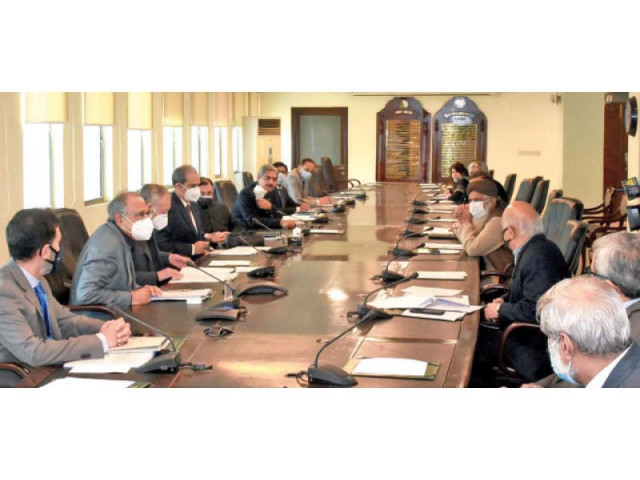Planning Commission proposes cut in interest rate
Planning Commission recommends keeping currency stable

The Planning Commission on Thursday recommended to a high-powered board to cut interest rate to stimulate the economy and also did not favour any further rupee depreciation, saying previous fall in the currency’s value did not help exports.
The recommendations were made to the Monetary and Fiscal Policies Coordination Board, chaired by Finance Minister Dr Abdul Hafeez Shaikh, according to sources. State Bank of Pakistan (SBP) Governor Dr Reza Baqir was also among the participants.
An official statement issued after the meeting noted “significant economic recovery” in first five months of the ongoing fiscal year due to “accommodative” fiscal and monetary policies adopted in response to the Covid-19 crisis.
However, the sources said that Planning Commission Deputy Chairman Dr Jehanzeb Khan argued in the meeting that the current policy rate of 7% was still high as compared to regional countries. The finance ministry recommended keeping the rate unchanged at current level.
The Monetary and Fiscal Policies Coordination Board met ahead of the SBP-led monetary policy committee meeting, which is going to review the interest rate for the next two months.
“The SBP governor briefed that monetary policy is accommodative due to Covid-19 and has paved the way for economic recovery during first quarter of fiscal year 2020-21,” said the finance ministry.
There was an improvement in the country’s external accounts and the steady worker remittance inflows and improved trade balance of goods and services were the notable developments, he added.
Sources said that the Planning Commission also raised the issue of exchange rate and stated that previous rupee depreciation of about 30% against the US dollar did not increase exports. However, the commission noted that the depreciation helped curtail the trade deficit, primarily because of curbing imports.
The average exchange rate remained at Rs159.21 to a dollar compared to Rs155.34 in the same month a year ago.
The meeting was informed that Pakistan’s exports actually decreased by 7.1% or $690 million in first five months of the current fiscal year, which was contrary to the hype created by the Ministry of Commerce.
Exports of goods stood at $9.5 billion in the July-November period of current fiscal year against $10.6 billion in the same period of last year.
Outgoing Finance Secretary Naveed Kamran Baloch apprised meeting participants that timely action taken by the government mitigated the severe impact of pandemic on the economy as compared to other economies of the world.
“The economy has witnessed a considerable recovery during first five months of FY21 as a result of continued domestic economic activity,” said the finance ministry.
The Planning Commission deputy chairman endorsed views of economic revival in the first half of current fiscal year. “The economic recovery can be attributed to accommodative fiscal policy,” said Jehanzeb.
He stated that large-scale manufacturing and housing sectors had started showing signs of growth and improvement.
The adviser on commerce maintained that the domestic industry, especially export-oriented ones, may be provided support to expand operations. Similarly, the inflationary pressures must be kept in check to ensure competitiveness, he added.
Shaikh emphasised the active role of Monetary and Fiscal Policies Coordination Board in designing policies to address economic challenges. He directed to make the platform more effective for better coordination among all concerned to meet the desired macroeconomic goals.
The board should be more proactive in reviewing the impact of fiscal and monetary policies on economic growth, employment, investment and external sector of the economy, he concluded.
In the past, scheduled board meetings had been postponed on the intervention of the central bank, according to the sources.
Shaikh stressed the need for timely provision of economic data for effective policymaking. The meeting also noted that average inflation remained relatively low at 8.8% during the July-November period.
Although the government said that the economy was on the path of recovery and inflation pace was slowing down, the monetary numbers were not supporting the assertions.
The currency in circulation contracted by Rs18.3 billion as compared to expansion of Rs359.4 billion during the same period of last year. Similarly, credit to private sector contracted by Rs49.3 billion during July-October 2020 compared with last year’s contraction of Rs7 billion.
Credit to public sector enterprises (PSEs) contracted by Rs15.3 billion during July-October 2020 as compared to expansion of Rs7.2 billion during the same period of last year.
Published in The Express Tribune, December 25th, 2020.
Like Business on Facebook, follow @TribuneBiz on Twitter to stay informed and join in the conversation.



















COMMENTS
Comments are moderated and generally will be posted if they are on-topic and not abusive.
For more information, please see our Comments FAQ